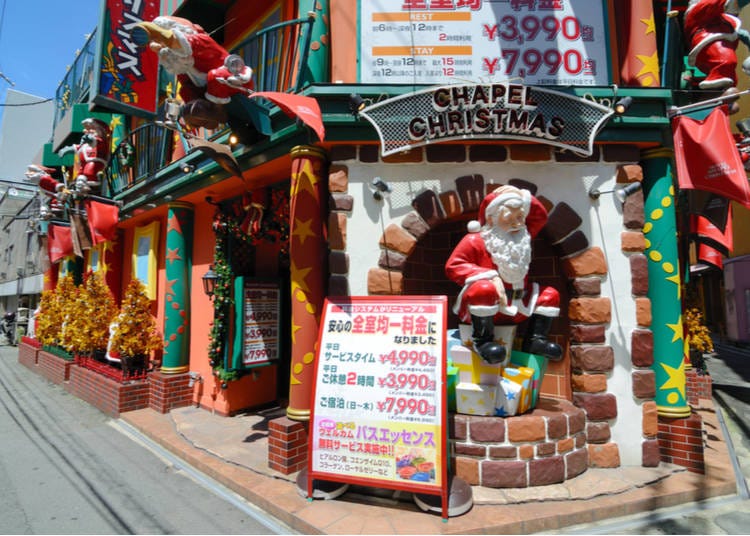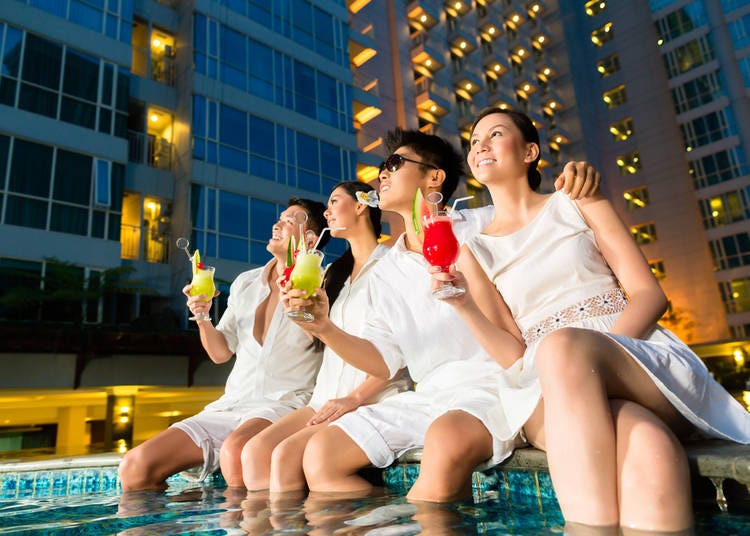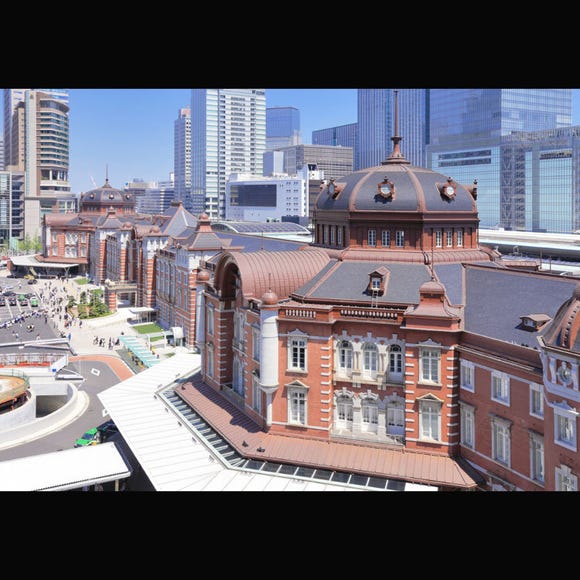
Japan Love Hotels: Finding Love in Modern Japan
- Written by: Sohail Oz Ali
Originally, Japan love hotels were discreet getaways for young couples looking for some privacy and intimacy. However, over the decades and changing times, has come changing attitudes that have made love hotels an accepted and even celebrated place for couples, friends, and groups of friends to partake.
We talked to people of various ages and backgrounds about their experiences and impressions of Japan love hotels.
Escaping the Normal in Japan Love Hotels

A 20 year old female Japanese graphic designer Noriko felt, “The image of love hotels is more relaxed than it was before. Now sometimes we [females] get together at love hotels and have a pajama party.” It seems less of a taboo or forbidden place than when love hotels first gained popularity.
Those who have never been to Japan or Asia might not be familiar with the concept of love hotels but these hotels have been ingrained in the culture and society for decades as a place for couples to escape and enjoy intimate moments.
Originally, Japan love hotels were used when prostitution became illegal and went underground. Love hotels also began in post-war Japan as a place for young married couples who lived with extended families in close quarters to come together in privacy.
The first love hotel called Hotel Love, opened in Osaka in 1968. Since then, Japanese love hotels have grown to over 35,000 love hotels nationwide. Due to increased demand, growing popularity amongst international visitors and the increased safety and discretion of staying in love motels, more and more areas in Japan have love hotels popping up.
Housing in Japan which is limited in space due to high costs of real estate and density of population causes many families to share multi-purpose spaces and pull out futons at night converting their daytime living space to bedroom space. This limits chances for couples with kids or living with their parents to have intimate relations.
Japanese Love Hotels: Not just sex-themed hotels

Kosuke, a 23-year-old male from Osaka, admitted, “The reason why I use the hotels is that there is no other places to do that [sex], you know,” adding, “it’s also cheap if I choose short stay.”
Living space is cramped and narrow, with walls being thin and neighbors being closer together within ear range, adding to the difficulty of enjoying a private couple time. With the embarrassment of sounds traveling to neighboring apartments and the constraints on space, couples search for places where they can let loose, forget their surroundings, and indulge in their passion.
For this reason, love hotels have become places that provide short two to three-hour stay options along with overnight stays. Bigger rooms, thicker walls, less window or external noise combined with fancy jacuzzi baths, plenty of free beauty and health amenities and a plethora of options that regular hotels don’t offer, appeal not only to married or young couples but for those looking to enjoy a fun and unique resort-style experience at budget prices.
Alongside the need for privacy and space, many people looking for discreet or convenient places to spend a couple of hours created a new market for love hotels as they started spreading out across the country. Located conveniently near stations, highway exits, and party zones brought in a whole new market of people looking to continue their dates beyond the last train home.
Out of the forty people we surveyed, both Japanese and foreign as well as male and female, 66% said they had visited love hotels. And 25% hadn’t but wanted to, making love hotels still an important and intriguing option for those in Japan. Jonathan, an American living in Yokohama, said, “I have visited many times. The sexual experience hasn’t always been pleasant, but the love hotel room itself has never disappointed me.”
Amongst the many reasons people visit love hotels, some of the most popular are young teens looking for a secret spot where parents can’t find them, secret rendezvous between those having love affairs, a place for underground prostitution and travellers looking for short budget friendly stopovers while travelling. 53% of people surveyed felt love hotels were a cheaper option for accommodation and 76% said they decided to go to a love hotel based on fun themed rooms.” Jin, a Japanese male simply stated “Cheap. Fun. Flashy,” as his reason for going to love hotels.
Another winning feature of most love hotels in Japan is the anonymity as there is no paperwork, I.D., or even face to face interaction required. Usually, an electronic touchpad to choose a room and payment done in-room via a check-out machine means there is no need to divulge names, relationships, private information, or even see a person face to face. A small window where only hands are seen as well as different elevators for in and out makes it so from start to finish you never have to see anyone in the hotel if you don’t want to be seen.
As love hotels became more available and convenient, clientele varied, and with it, so did the look and feel of love hotels. No longer just being a place to get away, with the influx of visitors and competition between love hotels, decor, and perks became integral for the love hotels to prosper. A better and more variety of amenities than fancy big-name hotels helped love hotels became popular alternatives to grande hotels.
With 84% of responders feeling love hotels were fun, safe, and clean, the stigma for staying at a love hotel is no longer there. In fact, Rachel from Australia had an awkward experience with a love hotel. “Accidently booked it when my parents visited because it was cheap. They were freaked out but the room was cool and better than a lot of budget hotels or Airbnbs,” she reported. The big attraction to love hotels seems to be the work they put into the look and theme of hotels.
Love hotel themes

In the bubble years of Japan (80’s) and beyond, themes and the look of the hotel has become a driving force of whether a love hotel will succeed. The exterior of the hotels is designed to look like fancy castles, luxury estates, extravagant mansions, or even shaped in unique and bizarre shapes like a UFO or a cruise ship.
The interiors also match the extravagance of the exterior, being decorated in fancy wallpapers, art, leather, vibrant lighting, and luxury furniture. Themed hotel rooms were created to cater to various tastes of the people visiting, including elegant imperial looks, anime and character themes, S&M dungeons, pirate ships, prisons, classrooms, and office and train compartments.
Any fetish or desire one wanted could be found in a safe, private, and non-judgemental space. Commonly in the peak of love hotel popularity, ending a date in a fun and fashionable love hotel became standard practice, and much like fancy sports cars and jewelry, elegant over-the-top love hotels became a status symbol which men used to impress women.
As news and popularity of love hotels grew across the world, many other Asian countries also had love hotels springing up in big cities. Many tourists from Europe and North America also flocked to Japan to experience love hotels themselves. Searching out tacky, quirky and sometimes just weird love hotels became an adventure for love hotel enthusiasts. Everyone wanted to stay in the strangest, most colorful and amusing hotel to show off to their friends and families back home. Chika, a Japanese university student, took her boyfriend who was visiting from the US. “He wanted to see the hotel because it was colorful and interesting.”
Tom and his wife visit love hotels often to spice up their love life and indulge in the free perks and amenities. “I love them. Probably the most underrated and misunderstood aspect of modern Japan. My wife and I go to them sometimes for a break. Some of them throw in food and beers - much cheaper than business hotels and a million times more comfortable. Bose stereos, massage chairs, rodeo machines, mechanical surfing machines, PlayStations, big-screen TVs...even went to one with a private rooftop onsen! And they even have other attractions the Missus likes...”
Love in luxury

However, with the burst of the bubble in the Japanese economy and the change in tastes of younger people, Japan love hotels also have had to adapt and change to keep their appeal.
Unlike the past, when Japanese people got married and stayed with extended families, thus having big households, recently, many Japanese singles tend to move out early and once married live apart from their parents.
This separation of living has caused the need to find private places to dwindle. Ryo, a mid 30’s salaryman who lives near Shinjuku, said, “My apartment does the job. Love hotels are good for a lot of people, but I have other options for romancing a lady.”
Also, pressure from the Japanese government and the trend to clean up the seedy images and impressions of Japanese subculture before the 2020 Olympics also influenced love hotels.
Many changed their names, designs, and marketing to seem less strange and more luxurious. The flashy lights and odd names were replaced with modern, sleek designed signs and names. The interiors moved from gaudy carpeting, furniture, and randomness to an elegant, modern five-star hotel-style decor.
Video games and Karaoke machines were replaced with giant flat-screen TVs and Internet options. Food menus and in-room services became available with a variety of delicious and decadent Japanese and Western options. Becoming a member of the hotel also offers perks like free drinks, desserts, and room upgrades. Love hotels even changed their category name from Love Hotel to Leisure or Amusement Space or Boutique Hotel.
Unfortunately, with all these changes and adjustments to appease government pressures, the original appeal to love hotels has started to decrease. Many competitive business hotels and regular hotels have started offering discount prices for short stays or day use at affordable rates. And with big-name hotels with competitive prices looking and feeling the same as love hotels, many people are opting for mainstream hotels and Airbnbs. By changing the look and removing the fun and mystery of the love hotel, many love hotels ironically have lost their appeal to tourists and those looking for a fun escape.
But the love hotel hasn’t disappeared. The current trend to keep love hotels afloat has been to recreate the image to a more professional, modern, and affordable place for those looking for accommodation. Especially during the Tokyo Olympics as a considerable amount of visitors from around the world will be arriving with no place to stay.
Many hotels are already sold out and booked way in advance, making the need for accommodation great. Love Hotels with their new and clean image will reap the benefits of this overflow from regular hotels. But after the Olympics, when everyone has left, will love hotels be able to compete without the fun and freaky appeal they once had?
More than just love

Kana, a 28-year-old Japanese female who used to visit love hotels in the past with her boyfriend before they got married, mentioned, “There seem to be many people staying with their friends because it is cheap and spacious.” Love hotel owners have also noticed this and are once again pivoting their hotels to a different market.
Thinking ahead, many love hotels have reinvented themselves as a place of fun, resort-style getaway for friends and groups to gather and have parties. No longer just for couples, many love hotels have renovated their hotels to feel like day salons and beauty and health getaways.
Hair and face treatments, oil massages, face masks, aromatherapy, comfort, and beauty rooms that allow groups of young girls or guys to indulge in beauty and self-improvement are the trend. No longer the need to hide faces, identities, and be secretive, these love hotels have created beach island, chic New York, or fancy upscale backdrops for people to order in-room food and alcoholic sets along with various services to enhance a group experience.
Many have added kitchen cooking options for those looking to have food parties. The bathroom space and makeup counters have been widened for girls doing makeovers or facial and spa treatments. The rooms have couches and lounge furniture for people to gather and talk. Checkouts can even be as late as 3 pm, making it more appealing to those having late nights without the worry of having to check out early the next day.
Although these love hotels have modified their look and target audience, it is no secret that love hotel visits have been on the decline over the years. Will love hotels disappear from the Japanese landscape? I highly doubt it. Much like they have in the past, they will face a variety of social, governmental, and external issues but will always adapt and find a way to adjust to the changing ideas of people.
They might change their name from love to leisure, amusement, or boutique. Still, Japan love hotels will always remain an important and readily available option for those looking to find a short stay and a unique and different experience from a typical hotel atmosphere.
Sohail Oz Ali is a Canadian Youtuber, author and blogger who has lived in Hokkaido, Nagoya and now resides in Chiba. Between visits to Karaoke and revolving sushi restaurants, he enjoys walking his dog, watching Japanese love dramas and teaching English. You can also find him roaming the streets of Japan looking for the next big YouTube video trends.
- Area
- Category
*Prices and options mentioned are subject to change.
*Unless stated otherwise, all prices include tax.
Popular Tours & Activitiess
Recommended places for you
-

Tsukiji Outer Market
Old Towns (Shitamachi)
Tsukiji
-

Ueno Zoo (Ueno Zoological Gardens)
Zoos, Aquariums & Botanical Gardens
Ueno
-

Senso-ji Temple
Temples
Asakusa
-

Ameyoko Shopping Street
Old Towns (Shitamachi)
Ueno
-

The Tokyo Station Marunouchi Building
Landmarks
Tokyo Station
-

TOKYO SKYTREE®
Landmarks
Ryogoku / TOKYO SKYTREE(R)
-
Ad

What Makes Japanese Yakiniku So Darn Good? Guide to Cuts, Heat, and Wagyu Know-How
-

A New Tokyo Landmark Is Coming in 2026, and It's Built for Modern Travelers
by: Guest Contributor
-

Top 3 OSHI MAPs for the Best Matcha and Sweets in Tokyo
by: Guest Contributor
-

To the Holy Land of Kawaii! Odakyu Tama Center Station Is Becoming a Dreamy Sanrio Wonderland
by: Guest Contributor
-
Ad

The Latest Guide to "Tourism Mobility": Traveling Japan More Freely. What exactly are Japan’s version of ride-sharing and transit deserts?
-

Farewell, Heavy Suitcases! Keisei Ueno’s New Service Makes Your Last Day in Tokyo Totally Hands-Free
by: Guest Contributor
-

Staying at a Japanese Capsule Hotel: 'Is It Really This Compact?!'
-

6 Fun Things to Do at Tokyo's World-Famous Tsukiji Outer Market!
-

Autumn in Japan 2026: Fall Foliage Forecast & Where to Enjoy the Colorful Leaves (+Tour Info)
-

Three of the Best Hotels Packed with Essence of Japan
-

Tokyo Roppongi|Roppongi Station Area Map & Sightseeing Information
-

Relax and re-energize in a renovated guesthouse in rural Shimane, Japan
- #best ramen tokyo
- #what to buy in ameyoko
- #what to bring to japan
- #new years in tokyo
- #best izakaya shinjuku
- #things to do tokyo
- #japanese nail trends
- #what to do in odaiba
- #onsen tattoo friendly tokyo
- #daiso
- #best sushi ginza
- #japanese convenience store snacks
- #best yakiniku shibuya
- #japanese fashion culture
- #best japanese soft drinks













